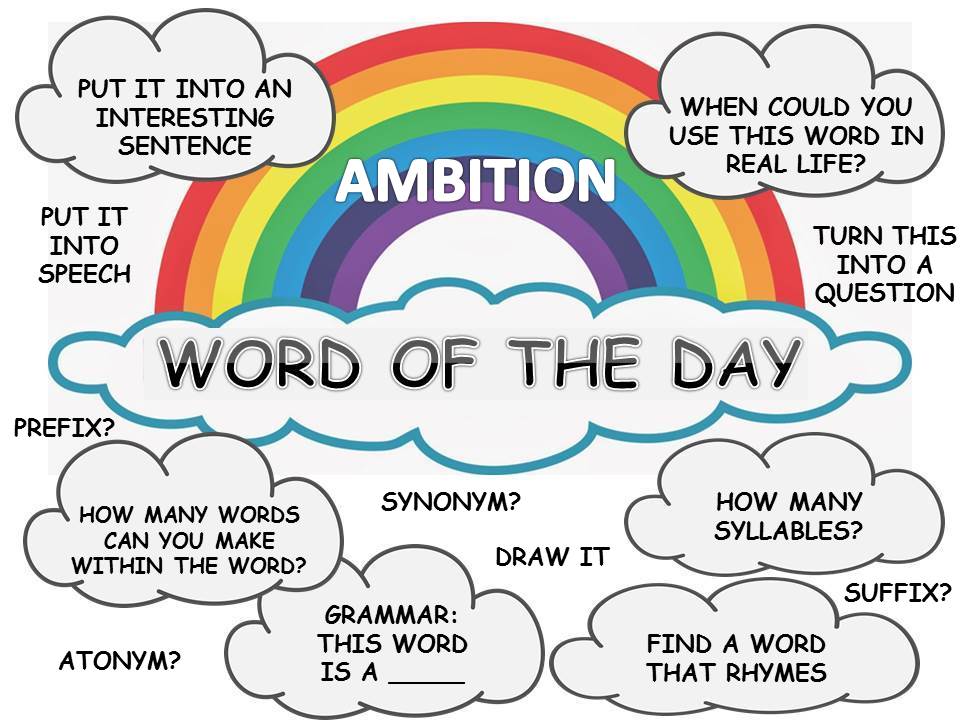
All students have access to at least 2 (and in most cases 3) grade levels of curriculum for each subject, so they can move ahead or review at their own pace. Welcome to Homeschooling Guide – Are you new to homeschooling? This guide was written by seasoned homeschoolers to answer some of the difficult questions new families often struggle with.Ĭurriculum Lesson Plans – An overview of the number of lessons that are included for each grade and subject. Our lesson planning worksheet can help you estimate how many lessons to have your child do each dayĪdditional Helpful Parent Tools & Resources.Detailed list of PreK language arts lesson plans.PreK curriculum overview with a summary of key preschool learning objectives.If you’re interested in preschool spelling lists or vocabulary words, you might also be interested in:
Word of the day for kids download#
To add more value, download our PreK spelling list printable worksheet with +100 words! What spelling words should your preschooler know? Here is a list of 50+ words that are great for use in spelling games, tests, or practice for an upcoming spelling bee. Help your child excel in spelling by trying out our PreK demos.

Time4Learning teaches a comprehensive preschool spelling curriculum using fun activities to build a solid spelling foundation.
Creating a rich language environment at home based on the quantity and quality of words spoken. Instruction through guided spelling activities like word sorts or word boxes. Setting daily blocks of time for spelling and reading activities. Personalized tutoring and assistance to boost confidence. Playing of spelling games, quizzes or word games to help develop their spelling skills. Spelling bees for a fun way for your child to practice their spelling. Frequent study of spelling rules like the relationships between letters and sounds. Constant reading or use of reading workbooks. Regular writing for a head start on spelling, punctuation, and other concepts. With help from their parents, children can develop and reinforce foundational spelling skills through the following activities: Children should (with help from their parents) develop their foundational spelling skills through an interest in words, regular writing, constant reading, a study of spelling rules, and playing of spelling games Spelling skills should develop as part of an overall language arts phonemic awareness, phonics, reading comprehension, vocabulary and reading fluency, grammar, reading and writing program. You can skip lessons that teach concepts your child has already mastered and repeat those he or she has not. This is why so many parents enjoy Time4Learning’s student-paced curriculum. Remember, every child learns at a different rate, so what works for some students may not be the best approach for your child. These very young children learn through spelling activities including many creative methods that make the preschool spelling program fun for them. A list of preschool spelling words might start with MAD and include MAN, MAP, and MAT as well as DAD and SAD. Also, they might vary the vowel and go to HOT. From AT, in preschool spelling, the curriculum, worksheets, and then spelling tests would cover BAT, CAT, HAT, and SAT. For example, a good starting point for preschoolers would be: AT, ME, BE, and IT.Ĭhildren then start to expand the list by working through “word families”. In preschool, spelling words start with basic two-letter words. 
 Additional Helpful Parent Tools & Resources. This page is a summary of curriculum topics, foundational skills and resources related to preschool spelling including information about: Time4Learning is an online student-paced learning system popular as a preschool homeschool curriculum, as an after school tutorial and skill sharpening during the summer break.
Additional Helpful Parent Tools & Resources. This page is a summary of curriculum topics, foundational skills and resources related to preschool spelling including information about: Time4Learning is an online student-paced learning system popular as a preschool homeschool curriculum, as an after school tutorial and skill sharpening during the summer break.







 0 kommentar(er)
0 kommentar(er)
